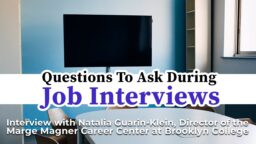TUN sits down with Natalia Guarin-Klein, director of the Magner Career Center at Brooklyn College, to discuss the questions you can ask (or not) during job interviews.
TUN: Natalia, thanks so much for joining us.
Guarin-Klein: Thanks for having me.
Why is it important to ask questions during job interviews? What does it show the interviewer?
I think it’s so important. It’s something that you must consider while preparing for your interview because it shows interest to the employer. You want to show them that you put in effort and energy by doing research and preparing questions.
Also, if you don’t ask a question, it kind of indicates to them that maybe you interviewed because you’re desperate for a job and you’re not even quite sure what you’re interviewing for.
So, by taking that extra step to do research and come up with good questions, it lets that employer know, “Wow. They must be really interested.”
How many questions should an applicant ask the interviewer? Is there a set range?
I don’t think there is a set range, but I usually recommend at least five. It doesn’t mean you’re going to actually have the chance to ask those five questions.
You don’t want to be in a situation where one of your questions gets answered during the overview or the introduction, if you’ve only prepared two or three questions. Maybe the next interview is running late and they have time to keep talking to you. You’ll start to feel nervous if you say, “No, I have no other questions.”
So, I always say at least five. It never hurts to have more prepared, as long as you understand that you may not have a chance to ask them all.
When you say, “applicants should prepare questions,” do you mean in their minds or physically on a piece of paper that they bring to the interview?
I think it’s definitely appropriate and okay to have them written. I’ve never encountered, either personally or while advising students, an instance where an employer was upset if an applicant is reading.
Just like anything, I wouldn’t read literally every single question from the paper. You could have notes and glance at your questions. I wouldn’t spend the time literally reading off the paper. But, I would have them ready in your notebook or portfolio that you brought with you.
What are some of the best questions or topics to bring up during a job interview? Can you run us through a few?
I actually recommend that students don’t Google or look for a book that says, “best questions.” If you’re doing that, other people are doing that, which means the interviewer is getting a lot of similar questions. That’s kind of boring, and it’s obvious to them that you Googled or looked up questions.
So, my recommendation is to come up with your own questions based on your research. So, when you’re looking at the company’s website, maybe there’s something about an award they’ve won or recognition that they’ve received that really stood out to you. Maybe there’s a training program or an initiative that they have that you thought was cool.
That way, you’re following up on what you learned on the website. The questions are not generic and they’re not, “I don’t know anything about the company.” They’re really a follow-up to the research that you’ve done.
Don’t ask something that is on the website that’s very clear. That means you didn’t do your research. Don’t ask questions that the person answered earlier in the conversation while you weren’t paying attention.
You can ask some basic questions in terms of the next steps. You can ask, for example, “What can I expect in the process if we move forward.” That’s a good generic question.
You can ask questions about what they enjoy most about working at the company, how long they have been there, the things that have made them stay for the 10 years, if it’s 10 years, or why they chose the company. Those are good generic questions.
But, the majority of the questions should really be detailed, specific to the company and based on research that you did.
Are there any other topics that applicants should avoid, like, for example, bringing up salary or benefits?
So, my tip is to wait till you get the offer. Differentiate between the questions before you get the offer and after.
After [you get the offer] is when you could ask, “Do I have to work weekends? Is there going to be a lot of overtime? What do my benefits look like?” That’s after, once you have the offer.
Don’t ask any questions that are going to make the employer pause and say, “Why are they asking that?”
If you were to ask, “Do I have to work long weekends or long nights,” that might be something you really want to know. But, it may make them concerned that you’re going to be worried about working long hours.
Things around salary and benefits, I would not ask before. Wait until you have the offer on hand.
The questions you ask during the interview should be more around trying to understand if the company is a good fit for you culture-wise.
Hopefully, you get an offer. At that point, you’re welcome to ask a few additional questions. I wouldn’t have a list of 20, because it will sound like you’re interrogating them. But, pick those two or three make-or-break topics. Decide what’s most important to you, and then you could follow up after the offer to ask those questions.
Thanks, Natalia, for joining us today.
My pleasure. Thank you for having me.
This interview has been edited for clarity. Watch the full video here.



